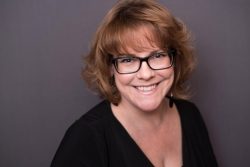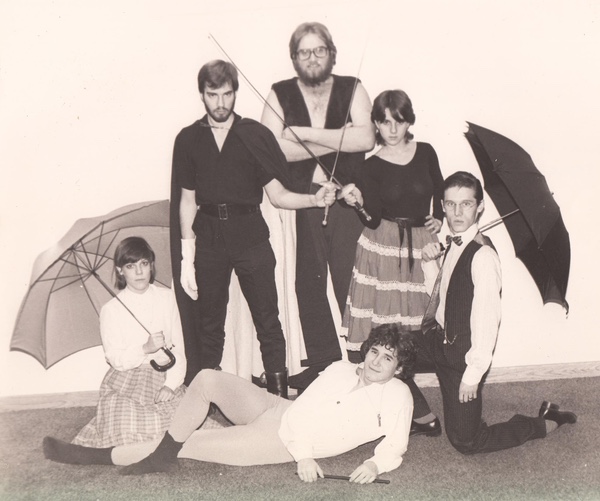4 Questions: Sara Meurling
This article is part of our series 50 Years of Disruption, in celebration of the Department of Theatre’s 50th Anniversary. In it, we’ll ask each participant four questions about themselves and their time at York.
1. Who are you?

I graduated with a BA in Theatre (1985), with a first professional position in the Toronto community at the Theatre Centre that year. As General Manager (then producer) I was also very active in volunteer positions such as Secretary of the Toronto Theatre Alliance (TTA) Board of Directors, and Chair of the TTA’s Small Theatre Caucus, a member of the Steering Committee for STAF – the Small Theatre Administrative Facility (now Generator), and a member of the original ArtsVote project in the late 1980’s. As an independent producer in the 1990’s, I worked with such artists/companies as Death Waits/Candid Stammer, Theatre Gargantua, Solun Theatre, Company of Sirens, Threshold Theatre, the Ontario Puppetry Association, and many others. In 1995, I joined the Dance Umbrella of Ontario where my clients included Peggy Baker, Denise Fujiwara, Lata Pada, Carmen Romero, Norma Araiza, and Bill James. Then, I veered off course from 1998 to 2006, when I was General Manager of Carbon Computing, one of Canada’s largest independent Apple Computer resellers where I managed Carbon’s growth from single office to a multi-location, $18.5 million sales and service operation. I returned to theatre in 2007, beginning again as General Manager of the Young Centre for the Performing Arts in the Distillery District. From 2009 to 2014, I was Managing Director of the Factory Theatre. I have been President of the Board of STAF and for Theatre Gargantua and a member of the Board of the Toronto Alliance for the Performing Arts and the Toronto Arts Council Theatre Committee. I became Executive Director of the Professional Association of Canadian Theatres (PACT) in the fall of 2014. I have been excited to work at a level that would assist Canadian theatres in solving problems that I had grappled with as a theatre manager/producer. Here, I work with member companies from across the country, supporting them in labour relations with Canadian Actors’ Equity Association, Playwrights Guild of Canada and Associated Designers of Canada. Over the last three and a half years, PACT has been engaged in implementation of a strategic plan that focusses on transparency, openness, accessibility and a major initiative to foster equity, diversity and inclusion in professional Canadian theatre.
2. What was your favourite moment during your time in the Theatre Department, and why?
Hmmm…. That’s a hard one. But perhaps an assignment from first year Theatre History with Anatol Schlosser. We were asked to produce one of the Everyman plays in a historically accurate manner. Which I ultimately ignored, as director, staging it as an environmental piece in the courtyard of Central Square, with the people peering through the glass and wandering between the ‘wagons’. I didn’t get a good grade (it wasn’t historically accurate) but I thought it looked fantastic and loved creating the audience experience.

3. What comment, quotation, statement, or action that a professor—or classmate—offered had the greatest impact on you?
That’s easy—it had to be when Don Rubin told me I was smart enough and charming enough to do whatever I wanted—if I committed to it (that’s a paraphrase). We were meeting in fourth year to talk about where I wanted to go and he was identifying what had been an obvious lack of commitment to any particular aspect of theatre in my studies and academic work efforts. (I had changed focusses in department a number of times—performance, then costume designer, then theatre studies.) I have remembered that and it helps me to focus my attention (I was diagnosed with ADHD just a few years ago) and energies. Turns out my love of theatre, and my particular skill sets, combined with ADHD and a bit of a control freak tendency, make for someone someone ideally suited to manage a company or produce theatre.
I was proud to speak at Don Rubin’s retirement party last year—I told him then and I still think it, in some ways he is my theatre ‘father’, the professor who have me the guidance (and the lecture) that made it possible for me to make theatre my life.
4. Is there a way you incorporate a particular aspect of your theatre training in your current work?
I think it was my training at York that gave me was an understanding of all the aspects of theatre, from production design and technical practice through to criticism (which made it possible for me to understand how to pitch as story as a publicist). I often say that I was called to theatre and not to a specific function within it. York’s theatre department and vital independent producing community gave me the grounding I needed to become a successful theatre manager and producer.
